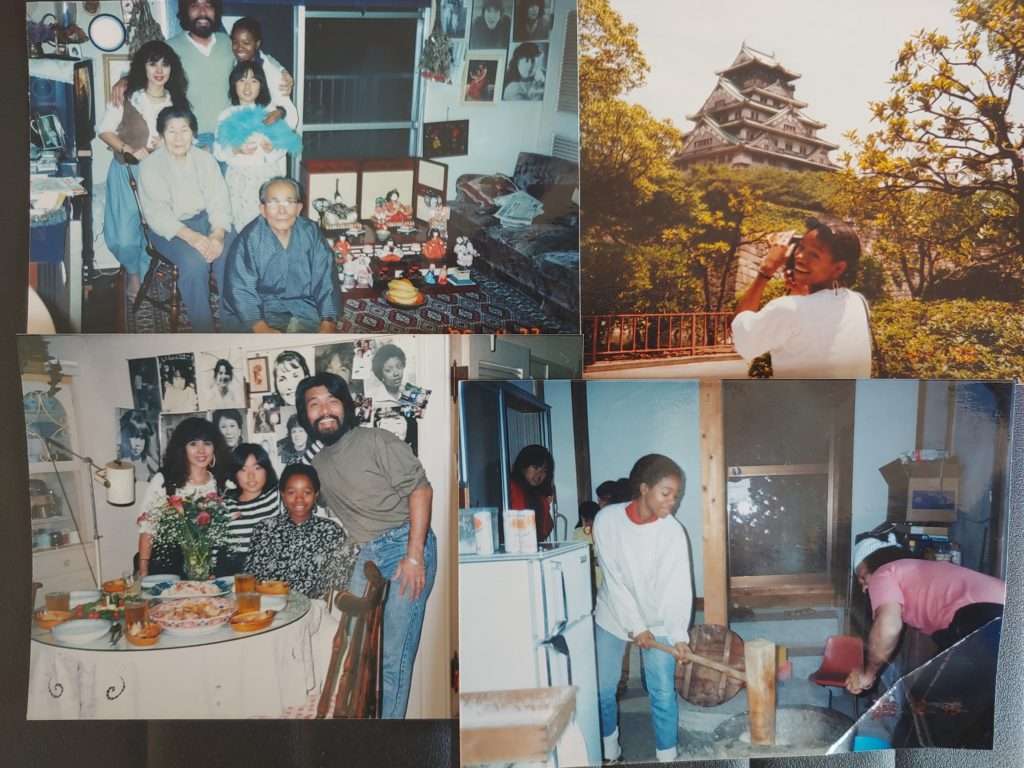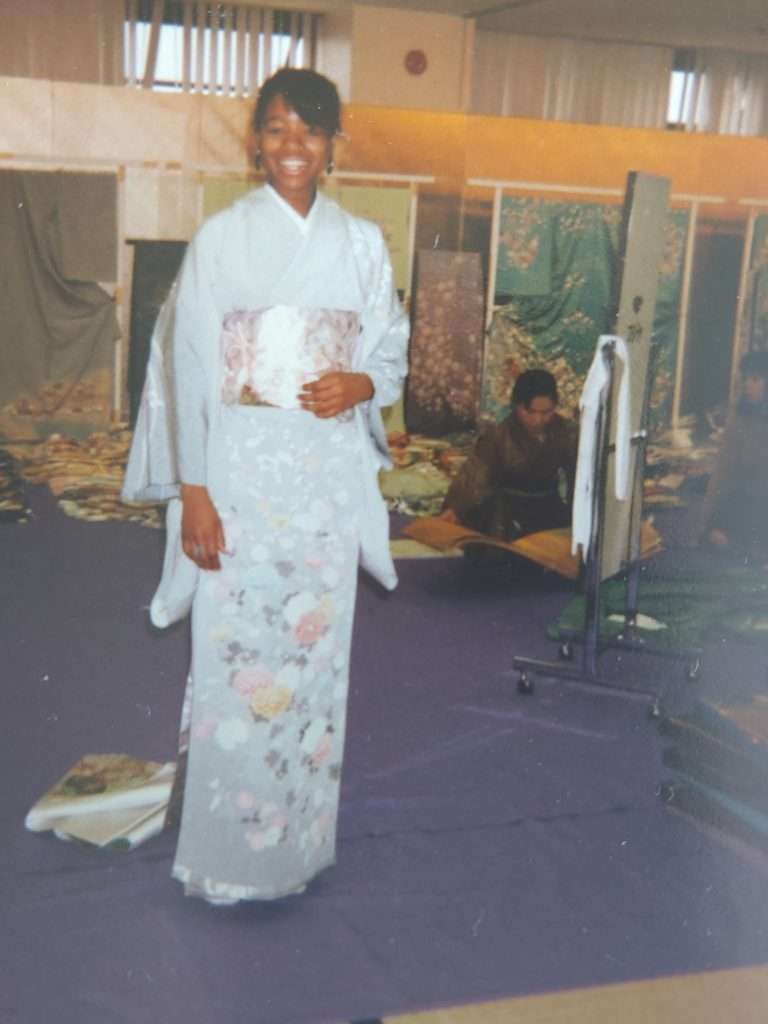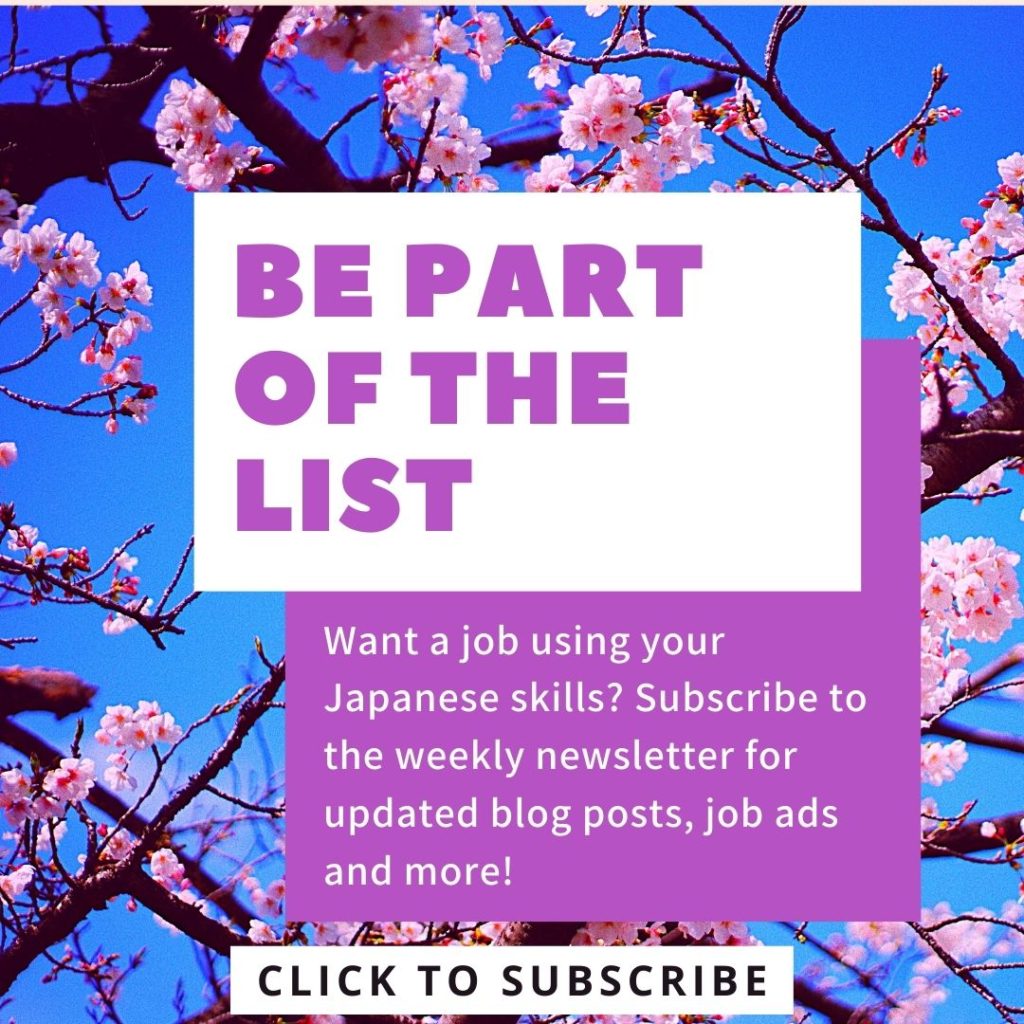Yvonne’s journey to becoming a Japan-focused business and technology consultant and entreprenuer will astound you. Read about how a coin toss started her down a Japan journey that included a college study abroad, teaching, entrepreneurship, and even the magical world of hostessing. “Lessons can come from anywhere” – and that kind of mindset, paired with an open mind to opportunities, is key to career success.
Welcome to the Senpai Success Story, where you can read about others who have walked a unique career path using their Japanese language/cultural skills. (Senpai means “mentor” or “teacher,” and the concept is important to understand for anyone wishing to work in a Japanese business setting.)
It Began with a Flip of a Coin
A requirement for my degree in International Business and Economics was to do a year abroad. I flipped a coin to decide between the two leading economies at the time after the U.S. Heads was Japan. Germany lost the toss (but would have its turn years later). The year was 1989. That is how my wonderful, 30+ year (so far) Japan-related life and eventual career began.
I was born in Jamaica and moved to the United States when I was young. I am adventurous and have a deep love of travel, and I looked forward to the new adventure that would be Japan. I knew little of Japan and its culture other than what I had read in books and a brief course I had to take when I was accepted into the program.
That first year in Japan at Kansai Gaidai University in Osaka was a great entry into this new and different culture, and I loved it from day one. My homestay family was wonderful. They were not the ‘traditional’ Japanese family, although I did not know this at first. They were young, vibrant, open-minded, and curious. They loved hosting students; I was number 14.
Embrace the New and Different
My homestay family loved learning about new people and cultures, so they were so glad I was Black and originally from Jamaica. They had other Black exchange students before, but I was the first Jamaican. We got on wonderfully! Yuzo-papa (as I called him) was a large man by Japanese standards, had a full beard, and was the cook in the family. He was from Kyushu and open and friendly. Rie-mama was a dynamo with permed hair and bright make-up. She was lively, witty, and did not like to cook. My little sister, Arika-chan, was sweet and called me “Big Sister.” I am the youngest in my family, so having a little sister was a new experience for me.
This family introduced me to Japan and supported me in learning about all things, good or bad, about their country. They wanted to learn about me and my culture, also, the Jamaican and the American. We had countless discussions on many topics including race, religion, and the plight of Blacks in America. They were open, curious, and honest in sharing their thoughts and feelings with me about their country and mine. We had a wonderful time together, and they went above and beyond for me. We had fun, explored a lot of intense topics, and learned lot together and from each other.
I fully immersed myself into my life in Japan: temples, shrines, food, castles, and history. I made wonderful Japanese friends who invited me into their lives and homes and treated me with great kindness and generosity. I maintain several of those friendships to this day, and one of my best friends made it possible for me to return to Japan for a second time after Gaidai.

Business Journey: If It Does Not Exist, Create It
After my year at Gaidai, I returned home to finish my final semester. After graduating, I realized that any entry-level job I could get would not give me direct contact with Japan, so within a year, I decided to go back to Japan on my own. I had $100 and friends! I knew I would make my way. One of my friends and her family welcomed me to their home in Kyoto. I was fortunate to stay with them rent-free for a few months while trying to find work.
It was difficult to get a business-related job in Osaka with sponsorship at the time. Osaka, although I love it, was not even near to being as international as Tokyo. I taught English as I continued to study Japanese and seek business-type work. Teaching in language schools provided a visa, but the curriculums lacked business focus. I had a business degree and I wanted to use it; that is why I was there.
I sought ways to move from just teaching English conversation to something more business related. Teaching business English was the way. I never understood why major language schools were using the same eikaiwa (English conversation) textbooks to teach both school kids and businessmen. I saw an opportunity. I created meishi (business cards) and started “branding” myself as a Business English teacher.
Smaller import/export companies especially needed help. I was teaching English but also providing informal consulting services to them—market research, procurement of new vendors (on my yearly vacation to the States and on other vacation travels) and managing relationships with these vendors via phone/fax the rest of the time. I was also able to get into several major firms (banks, consumer electronics, pharmaceutical companies) as a private business English teacher and later assisted a major language school in creating a business English program that I piloted to great success. Once I had a foot in the door, I navigated my way to more of a business consulting role in some of these companies.

Non-Traditional Education: What Hostessing in Japan Taught Me
Lessons can come from anywhere. I wanted to learn as much as possible about Japan. Not just what is on the surface, but the inner workings of the people and the society. Through a good Japanese friend, I got a part-time job as a ‘hostess’, and what I thought was just going to be a fun way to earn extra money for traveling turned into an incredibly wonderful learning experience for me. It was where I learned some of the most valuable insights into Japan, Japanese culture, and the Japanese business world.
I was privy to a lot because I spoke some Japanese and due to my background, I could understand and speak about business. I was seeking knowledge as I sat at tables amid the revelry. The relational interplay was fascinating. The usually stoic salaryman came to life in this setting. They were so much more than the stereotype the business world saw them as. They were men who had the same issues, concerns, hopes, dreams, and humanity as men everywhere. And they enjoyed themselves after work. They really enjoyed themselves after work, and I loved being a witness to that.
Lessons can come from anywhere.
Yvonne Burton
If You Cannot Get in the Front Door, Find Another Way In
There were not a lot of international job opportunities for a foreigner in Osaka when I lived there. In applying for a few jobs, I felt what might have been a hesitancy to take a chance a black female foreigner (Please note that this was speculation on my part after I had eliminated some other reasons because I did meet the overall qualifications for the positions). One company was honest enough to tell me that they were just not sure how their staff and customers would react to me and therefore did not want to take a chance.
My way in was through teaching business English (these companies took the chance) and then via the traditional social entertainment infrastructure of mizu-shobai (the water trade) that provided me with many contacts and an inside view that many others never experience. NOTE: The lounge/bar where I worked was professional and safe – strictly high-level social business entertaining only, respectable, and widely and wildly popular.
I quickly realized that hostessing was teaching more in some ways than I could ever learn in a traditional office setting. I was a sponge soaking up knowledge and nuances while gaining terrific insights. What I learned in that club, at those tables, with all those business customers still assists me to this day. It was a classroom like no other.
It helped me better understand Japanese companies, their workers, and the intricate hierarchical structure in companies and society that is preserved and so hard to change. The heavy burden of responsibility and complex constructs, need for conformity, and rigid rules that are so tightly woven together in the Japanese corporate structure. It helps me better understand my Japanese clients and how to best partner, work with, and support them in my present-day consulting work.
Technology Provides the Key
I passionately believed that my Japanese experience was valuable, and I wanted to use it by working in Japanese firms or in U.S. firms that did business in Japan when I moved back home to New York. I researched by doing temporary work in a few Japanese companies to get a sense of what opportunities were available, but nothing really suited me.
Fortunately, we were in the middle of the technology boom, and I was recruited into the largest online job site at the time and began working in online marketing and advertising as a project manager. A couple of years later, I was recruited again into a software development firm as a business analyst and stayed in that role full-time for several years at different corporations.
Again, I saw opportunity: Technology was an area in which I could help Japanese companies to compete globally in a more effective way. I started building a consulting practice with a focus on technology consulting services, targeting Japanese companies. I was getting some traction when the recession happened in 2009, and business eventually dried up.
For the past ten years, I worked for a large patent intelligence data and analytics firm as a business analyst on their global patent search software with a focus on its distinct Japanese module. I was able to use my cross-cultural background to successfully work with and help manage global, diverse project teams consisting of Japanese, Americans, Indians, Europeans, and Ukrainians.
During this time, in the evenings, I continued to teach business English (Business Communications) to Japanese professionals. I still had the dream of having my own business dealing with Japan and made sure I kept my hand in, even if it was only on a part-time basis.
Putting It All Together
I am truly fortunate for the years I spent in Japan and all my experiences. I wanted to put it all together and use it in the best way possible. For me, that is having my own business, Burton Consulting International. I am using all parts of myself—my Japanese cross-cultural background, love of working with Japanese people, technology expertise, business English teaching skills, analysis experience, ability to work with diverse global teams, and my creativity—to provide technology and communication services to help my Japanese clients achieve their business and personal goals.
I offer workshops, trainings, and coaching programs, all virtually. The pandemic made it necessary in the beginning, but I decided that it is the best business model going forward. The best way to learn technology is to use it and learning how to communicate and collaborate using virtual tools is critical for success in this age of digital transformation.
Advice For You
There are many ways to use your language (fluent or not) and cultural skills with Japan. Endless possibilities. Find the way that fits you best.
Mine was not the traditional path, and it was not by any real design. I just kept trying, adapting, moving forward, and viewing each step and challenge through the lens of opportunity. In the end, it gave me the portfolio of skills that make me an asset to my clients today.
For anyone who is interested in learning about Japanese language and culture, here are a few suggestions.
- Be open to new and different experiences when studying Japanese or learning about the culture. Every interaction can contain value and have deep long-lasting impact.
- Use your language skills whenever you get a chance, no matter your level – you will only get better by using it. I did not do this as much as I should have after I returned home, and my speaking skills have suffered.
- Take advantage of the opportunities that technology provides: Access to Japanese related content – Apps, classes, shows, news, manga, and anime – is at your fingertips.
- Take those entry level jobs! They can lead to amazing things.
Finally, I wish you the absolute best. Japan is a wonderful and enriching place, with a beautiful culture and people.
For more about Yvonne and Burton Consulting International’s services, please visit: https://www.burtonconsulting.biz


Yvonne, thank you so much for writing about your Japan experience (thanks also to Ikigai Connections!). I thoroughly enjoyed your story and found myself nodding my head as you described the many incredible lessons you learned starting with your homestay as a student and and then later on as English teacher and hostess. I too have maintained friendships with people that I met and worked with in Japan and those interactions have contributed greatly to my personal and professional growth. I too encourage anybody even remotely interested in going out into the world to do so and learn from those experiences. Most everybody that I know who has a similar Japan experience has told me that they are a better person for it! Your piece was beautifully written and a pleasure to read!
Seiji – thank you so much for reading Yvonne’s story and for posting your comment!
Yvonne, your story says alot … about your persistence, willingness to adapt, commitment to follow your inner voice … so much. Thank you for sharing so deeply and personally. You are an inspiration.
Camille, thank you so much for your kind comments about Yvonne’s superb story 😉
Wonderful story of someone who shows true grit.
Absolutely!